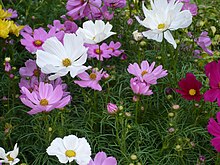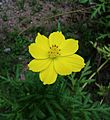Cosmos (plant)
| Cosmos | |
|---|---|

| |
| C. bipinnatus | |

| |
| C. sulphureus | |
| Scientific classification | |
| Kingdom: | Plantae |
| Clade: | Tracheophytes |
| Clade: | Angiosperms |
| Clade: | Eudicots |
| Clade: | Asterids |
| Order: | Asterales |
| Family: | Asteraceae |
| Subfamily: | Asteroideae |
| Tribe: | Coreopsideae |
| Genus: | Cosmos Cav.[1] |
| Synonyms[2] | |
| |
Cosmos is a genus, with the same common name of cosmos, consisting of flowering plants in the sunflower family.[3][4]
Description
Cosmos are herbaceous perennial plants or annual plants growing 0.3–2 m (1 ft 0 in – 6 ft 7 in) tall. The leaves are simple, pinnate, or bipinnate, and arranged in opposite pairs. The flowers are produced in a capitulum with a ring of broad ray florets and a center of disc florets; flower color varies noticeably between the different species. The genus includes several ornamental plants popular in gardens. Numerous hybrids and cultivars have been selected and named.
Species




Accepted species:[2]
- Cosmos atrosanguineus (Hook.) Voss
- Cosmos bipinnatus Cav.
- Cosmos carvifolius Benth.
- Cosmos caudatus Kunth
- Cosmos concolor Sherff
- Cosmos crithmifolius Kunth
- Cosmos dahlioides
- Cosmos deficiens (Sherff) Melchert
- Cosmos herzogii Sherff
- Cosmos intercedens Sherff
- Cosmos jaliscensis Sherff
- Cosmos juxtlahuacensis Panero & Villaseñor
- Cosmos landii Sherff
- Cosmos linearifolius (Sch.Bip.) Hemsl.
- Cosmos longipetiolatus Melchert
- Cosmos mattfeldii Sherff
- Cosmos mcvaughii Sherff
- Cosmos microcephalus Sherff
- Cosmos modestus Sherff
- Cosmos montanus Sherff
- Cosmos nelsonii B.L.Rob. & Fernald
- Cosmos nitidus Paray
- Cosmos ochroleucoflorus Melchert
- Cosmos pacificus Melchert
- Cosmos palmeri B.L.Rob.
- Cosmos parviflorus (Jacq.) Pers.
- Cosmos peucedanifolius Wedd.
- Cosmos pringlei B.L.Rob. & Fernald
- Cosmos purpurens Sherff
- Cosmos purpureus (DC.) Benth. & Hook.f. ex Hemsl.
- Cosmos scabiosoides Kunth
- Cosmos schaffneri Sherff
- Cosmos scherfii Melchert
- Cosmos sessilis Sherff
- Cosmos sherffii Melchert
- Cosmos steenisiae Veldkamp
- Cosmos sulphureus Cav.
Distribution
Cosmos species are native to scrub and meadowland in Mexico where most of the species occur. In the United States, some varieties may be found as far north as the Olympic Peninsula in Washington, but the range also extends through Central America to South America as far south as Paraguay[citation needed]. One species, C. bipinnatus, is naturalized across much of the eastern United States and eastern Canada.[5]
It is also widespread over the high eastern plains of South Africa, where it was introduced via contaminated horsefeed during the Anglo-Boer War.[6]
Gallery
-
Kerala, India
-
Kerala
-
Old house in Japan
-
Cosmos atrosanguineus, the chocolate cosmos
References
- ^ "Genus Cosmos Cav". Germplasm Resources Information Network. United States Department of Agriculture. 1998-09-07. Archived from the original on 2015-09-24. Retrieved 2011-02-13.
- ^ a b Compositae Working Group (CWG). "Cosmos Cav." Global Compositae Database. Retrieved 2023-05-17.
- ^ Cavanilles, Antonio José. 1791. Icones et Descriptiones Plantarum 1(1): 9–10, pl. 14
- ^ Tropicos, Cosmos Cav.
- ^ Biota of North America Program 2013 county distribution maps
- ^ Sandys, Celia (2009). Chasing Churchill: The Travels of Winston Churchill. Hachette UK. p. 92. ISBN 978-0786740154.
The South African Light Horse, having no baggage train and living largely off the country, were able to range widely across Natal. How widely can be seen from the spread of the beautiful pink cosmos flower, a native of Argentina which was imported into South Africa in the British Army's horse fodder. Just as cairns on the battlefields mark where soldiers fell, so their route is marked by the pink swathes of cosmos. As my children picked bunches of these lovely flowers for me I wondered if the seeds from which they originated had germinated in the belly of my grandfather's horse as he had ridden that way.
External links
 Media related to Cosmos (Asteraceae) at Wikimedia Commons
Media related to Cosmos (Asteraceae) at Wikimedia Commons Data related to Cosmos at Wikispecies
Data related to Cosmos at Wikispecies- Germplasm Resources Information Network: Cosmos
- Flora of Bolivia: Cosmos checklist




